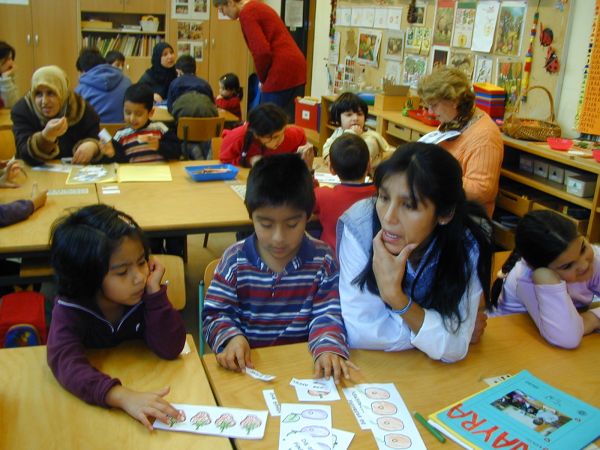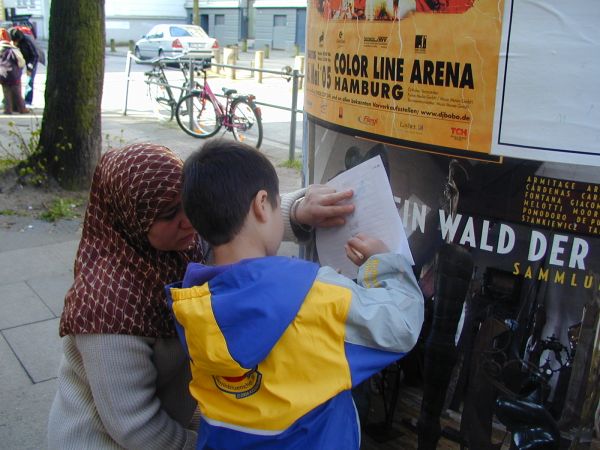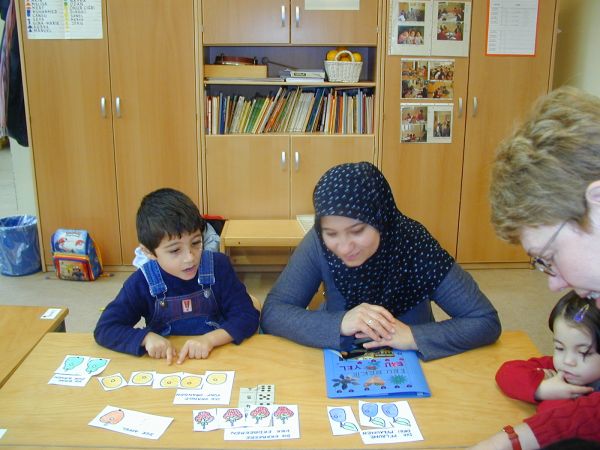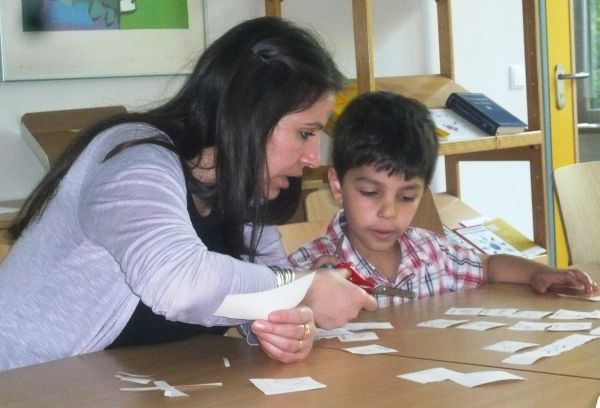Family Literacy Project (FLY)
Country Profile: Germany
| Population | 82,726,000 |
|---|---|
| Official Language | German |
| Total Expenditure on Education as % of GNP | 4.81 (2011) |
| Adult Literacy Rate (15 years and over, 1995-2005) | Female: 99 % |
| Sources |
Programme Overview
| Programme Title | Family Literacy Project (FLY) |
|---|---|
| Implementing Organization | State Institute for Teacher Training and School Development (Landesinstitut für Lehrerbildung und Schulentwicklung) of the Ministry of Education, Hamburg. In its initial phase, the UNESCO Institute for Lifelong Learning (UIL) supported the conceptualisation and implementation of the project. |
| Language of Instruction | German |
| Funding | During the pilot phase (2004–2009), the project was being equally funded by the Bund-Länder-Commission for Educational Planning and Research Promotion (BLK) and the City-State of Hamburg. Since 2009, the Hamburg Ministry for Education took over the upscaling of the programme involving 25 new schools each year. |
| Date of Inception | 2004 |
Background and context
Hamburg – Germany’s second largest city – has a significant proportion of resident migrants or citizens of foreign descent. As of 2006, for example, 15% (258,225) of Hamburg’s total resident population of 1,754,182 were non-Germans while 26.8% had migration backgrounds. In addition, 48% of people aged six years and under had migration backgrounds. Examples of key migrant groups include those from Turkey (23%); Poland (22.6%); Afghanistan (5.3%); Iran (3.4%); Russia (3%) and Ghana (2.1%). Hamburg’s ethnic diversity is also manifested in the world’s major religions with Christianity, Islam, Judaism and Hinduism, all having adherents in the city. The city’s ethnic and religious diversity creates challenges with regards to the provision of appropriate educational services. These challenges are compounded by the fact that many parents lack viable literacy skills to support their children’s learning. In particular many adult migrants are functionally illiterate and are therefore unable to actively and effectively participate in the educational development of their children. As a result, children from migrant families are more likely to underperform in school compared with other students.

In order to address the educational challenges faced by children (especially those from deprived social backgrounds and from migrant families), the UNESCO Institute of Education (UIE) and the State Institute for Teacher Training and School Development in Hamburg (Landesinstitut für Lehrerbildung und Schulentwicklung) initiated the Family Literacy Project (FLY) in 2004. The project was funded by the Bund-Länder-Commission for Educational Planning and Research Promotion (BLK) and the city of Hamburg as an integral component of the Promotion of Children and Young Adults with Migrant Backgrounds programme (FörMig: Förderung von Kindern und Jugendlichen mit Migrationshintergrund).
In 2010, the project was awarded the UNESCO King Sejong Literacy Prize.
The Family Literacy Project (FLY)
FLY is an intergenerational family literacy programme that targets parents, children at pre-school, kindergarten and early primary school, as well as children with special learning needs. Many of the targeted people are from socially disadvantaged communities. The project endeavours to develop the literacy skills (reading, writing, speaking, listening, and creativity) of parents and their children. It also seeks to promote strong linkages between the kindergarten or school and home-based learning processes by:
- supporting parents to increase literacy activities at home and enabling them to help with their children’s schoolwork
- training school teachers how to deal with and instruct children from diverse cultural backgrounds. In addition, the programme also encourages and supports strong interaction and cooperation between parents and kindergarten or school teachers, in order to enhance children’s learning capacities.
The project was first piloted in collaboration with seven schools and two kindergartens located in the deprived and mostly migrant-populated districts of Hamburg. However, due to increased demand from other schools, the project has since been introduced to 25 other schools. The expansion of the project was also facilitated by effective networking with other organisations such as the adult education centres which had similar or related mandates. The FLY curriculum, which is primarily produced by the facilitators on an ongoing basis, emphasises the following themes:
- language development
- listening and comprehension (e.g. through story telling)
- reading, writing and comprehension (reading aloud and discussions)
- letters and phonological awareness (initial sounds, rhymes, working with syllables)
- cultural awareness.
Aims and objectives
The project aims to:
- improve children’s early literacy and language skills development by training and empowering parents to take an active role in their children’s psychosocial and learning development
- improve the literacy skills of parents and children from migrant backgrounds
promote home-based learning through the provision of learning materials and training of parents as educators
create strong links and cooperation between school or kindergarten and home-based learning
- use literacy training to foster effective and sustainable integration of migrant communities into mainstream German society
- enhance the effectiveness of schools and kindergartens by training teachers and educators.
Programme implementation
The implementation of the programme is based on the effective training of school or kindergarten teachers, who are the principal programme facilitators, as well as on the active participation and involvement of adults in their twin roles as parents and child educators. The programme provides teachers and parents with specialised training to ensure project effectiveness and sustainability. After the end of the pilot project in 2009, the city of Hamburg (Behörde für Schule und Berufsbildung) provided 25 schools per year, situated in deprived areas, with additional resources to run family literacy as well as teacher training.
Teacher training
The programme requires two facilitators per school. The State Institute for Teacher Training and School Development in Hamburg provides monthly training sessions to school and kindergarten teachers, most of whom are language development educators. As the primary implementers of an intergenerational programme, teachers receive training in a wide range of subjects or themes relevant to children and adults, as well as in family literacy teaching methodologies. Furthermore, the training also emphasises cultural awareness or sensitivity in order to empower teachers to appropriately cater for and address the needs of children and adults from diverse ethnic and religious backgrounds. The State Institute also creates opportunities for teachers from various schools to share experiences and in doing so, improve their teaching skills.

Community involvement: Parental training and participation
The project is built on the basic principle that the family constitutes the fundamental springboard for children’s sustainable learning and education. Within the framework of FLY, parents are treated as equal partners and are therefore encouraged to play an active role in the planning and implementation of programme activities. This occurs at three different levels:
- Active involvement of mothers in the class Mothers participate in class on a particular day of the week – mainly after bringing their children to (pre-)school. They participate in literacy-related activities, such as looking at books together with the children or playing simple literacy games. The participation of parents in children’s classes is intended to familiarise parents with how their children learn and to evaluate their learning progress, as well as to empower them to be educators in their own right. Beyond this, it is also intended to create opportunities for parents and their children to interact within a learning context (for example, through selecting, reading and discussing a book together). Overall, it is important to note that parent-child activities foster strong bonds between children and their parents and build the foundation upon which the long-term success of family literacy programmes is based.

- Working with parents (without children) in parallel sessions Parents participate in literacy classes without their children present, under the guidance of an experienced educator. During these sessions, parents learn about how to support their children and produce learning materials (such as story telling bags, word cards, written stories and pictures) on various topics which they can use for home-based learning with their children. These sessions also create opportunities for parents to learn or improve their German skills, to focus on topics that are more relevant to adults such as child-rearing, health and nutrition and more importantly, to learn about other cultures.
- Joint-out-of-school activities Joint-out-of-school activities involve the participation of children, parents and facilitators in joint outdoor activities such as excursions to museums and libraries or a trip to a market near the school, ‘literacy walks’ and participation in special celebrations. These activities are intended to promote social networking among parents and parent-child bonding as well as action-oriented learning.
Teaching–learning methods
The teaching concept adapts to the circumstances of the school and programme participants. In general, action-oriented and process-oriented participatory teaching–learning methods are emphasised. During joint parent-child classes, participants are actively encouraged to work together in the learning process as well as in the production of learning materials. For example, parents write, read and discuss personal family stories with their children while children participate in singing and dance sessions.
Teaching and learning materials
In order to promote sustainable literacy development within a multilingual context, the FLY programme employs a variety of action-oriented, simple and contextually relevant teaching and learning materials. These materials are mostly produced by the participants with support from the facilitators and are made available for both home- and school-based learning. The key teaching and learning materials include:
- Multilingual ‘mini-books’: the mini story books are based on family photographs and biographies and are produced by the parents in several languages in order to promote intercultural and multilingual learning. The mini-books play a critical role in motivating parents and their children to learn, not only because the books capture and reflect the families’ biographical histories, but also because they create an opportunity to learn about other people’s lives, cultures and traditions. Overall, this tool can play a central role in intercultural education and in promoting social integration among diverse ethnic groups.
- Family literacy development packs: these comprise of learning materials such as children’s books and CDs or tapes containing language games, stories, rhymes and songs. The packs can be borrowed by the parents for use at home.
- Story-telling bags: working with story-telling bags is a method of exploring picture books in a holistic, action-oriented and creative way. The main characters and objects in a picture book are manufactured and kept in a bag. Once the picture book has been read (or during the first reading), the objects may be touched by the children, used interactively (in role play) or explored using the senses (smelling, tasting, listening).
Monitoring and evaluation
The FLY project has been evaluated by the State Institute for Teacher Training and School Development. The evaluation process sought to determine programme benefits using quantitative and qualitative methods, which included:
- structured interviews (questionnaires) with parents from different ethnic and social groups, educators from schools and day care centres, and headmasters
- parental observation of their children’s formal classes.
In addition, children were systematically assessed or tested on non-verbal intelligence and language competence at the beginning and end of the course in order to determine their learning progress and/or needs. This also involved testing in pre-schools and grades 1 and 2 (in language, reading and writing), as well as teachers’ assessments of children’s educational development. In addition, parents were interviewed before and after the course in order to get their independent assessment of their children’s literacy skills development.
Impact
- The project has enhanced adults’ communication abilities or skills, self-esteem and potential for greater social interaction with people from other ethnic or cultural groups as well as integration into German society in general. Hence, the programme has been a key instrument for social networking among adults and families from different socio-cultural backgrounds and between schools and communities.
Since its inception, the programme has benefited about 1000 parents and 1000 children annually. It has fostered strong relationships between schools and parents and as a result, many schools have established family literacy rooms where parents meet each time they visit the schools.
Parental involvement in their children’s education has strengthened family relationships as well as improved children’s literacy skills.
- Given that many teachers had no experience in teaching learners from different cultural backgrounds, the programme provided them with these opportunities which in turn improved their intercultural teaching skills. Most critically, the programme empowered teachers to understand, appreciate and better handle the dynamics relating to the cultural diversity that exists among children in their classes.
Challenges
Perhaps the main challenge that has emerged to date, relates to the inexperience of primary school and kindergarten teachers in the field of family literacy and adult education. Furthermore, most of the teachers had little experience with working with parents from different socio-cultural backgrounds. Hence, intensive training of teachers in family literacy, adult and intercultural education was required during the initial stages of the project to ameliorate these challenges.
Other challenges emerged from the inconsistent participation of parents in the programme due to pressing family commitments. Also, it was difficult to reach the parents most in need because they were often the most socially isolated. Thus, in order to promote consistent parental participation, a lot of resources and creativity were needed.
Lessons learned
As parental participation is voluntary, schools need to constantly remind and encourage parents to fulfill their obligation to support their children’s development. To this end, schools are encouraged to maintain a register of parents as well as attendance lists. As the programme has a strong adult education component, parental involvement could also be enhanced through the certification of participants upon completion of a course. This strategy will certainly boost parents’ morale, commitment and cooperation, all of which are necessary ingredients for the success of the programme.
Parental involvement in school activities improves cooperation and communication between teachers and parents and between schools and their communities. These relationships are mutually beneficial as, for example, parents have easy access to lifelong learning opportunities while the schools and children benefit from the support the children get at home from their parents. Parents bring into the learning process rich ideas born from their lived experiences. Furthermore, the opening of the schools to parents could gradually lead to the development of schools into community learning centres with increased networks with other institutions in the community such as social centres and libraries. Therefore, in order for family literacy programmes to be effective, parents should be treated as equal partners.
- Family literacy is a flexible learning model that can easily be adapted to different social environments as well as to the needs of the specific learners’ groups.
Sustainability
Due to the success of the project since its inception, parents in cooperation with schools, have undertaken extensive and concerted advocacy activities in an effort to secure institutional funding beyond the initial funding period (2004–2009). However, perhaps the most important indicator of the project’s sustainability is manifested by the strengthened cooperation between parents and schools as well as the resultant active involvement of parents in school activities and in the education of their children. It is thus hoped that since the programme is not very expensive to implement, strong parental commitment will ensure its long-term existence.
Equally important, the incorporation of the FLY project into the city’s integration programmes for migrants, indicates the potential of key partners to remain committed to the implementation of the project as an effective method to address challenges within migrant and socially disadvantaged communities. Indeed, the city of Hamburg acknowledged the FLY project as a ‘central element in the framework of possible action approaches’ for dealing with migrants (see: Hamburg Action Concept for the Integration of Immigrants, 19 February 2006). As a result, the City-State of Hamburg is upscaling the programme to include 25 more schools per year until 2013, as well as integrating the approach into the existing cooperation project ‘Kita und Schule’ (kindergarten and school).
Sources
UNESCO (2008): Family literacy: A global approach to lifelong learning: Effective practices in family literacy and intergenerational learning around the world. Edited by Maren Elfert. UNESCO Institute for Lifelong Learning, pp. 44–45.
May, Peter: Family literacy in Hamburg's schools. Approach and initial findings of the evaluation
Web links
UNESCO Literacy Prize 2010: http://www.unesco.org/new/en/media-services/single-view/news/unesco_literacy_prize_winners_for_2010_are_announced/
http://www.unesco.org/new/en/education/themes/education-building-blocks/literacy/literacy-prizes/2010/germany/QualiFLY website: http://www.unesco.org/education/uie/QualiFLY
Contact details
Dr. Gabriele Rabkin
Lecturer, Head of the Project
State Institute for Teacher Training and School Development, Hamburg
Felix-Dahn-Strasse 3, 20357 Hamburg
Phone: +49-40428842-517
Email: User: Gabriele.Rabkin
Host: (at) li-hamburg.de
Website: http://li-hamburg.de/
Last update: 14 November 2011








